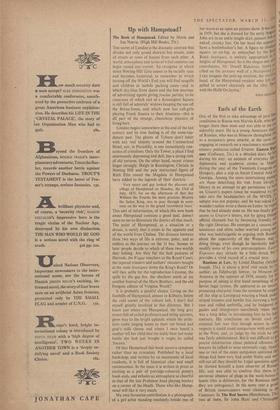Up with Hampstead!
THE secret of London is the dramatic contrast that divides not only postal districts but streets, sides of streets or rows of houses from each other. A world, atmosphere and series of tribal customs can begin round any corner. To recognise at which street Notting Hill Gate ceases to be racially sane and becomes hysterical, to remember in which turning off the World's End you will find seagulls and children in mobile packing cases—and in which sky-blue front doors and the low murmur of advertising agents giving fondue parties; to be conscious of which end of a Kensington Square is still full of admirals widows keeping the sun off the Burne-Jones, and which now has call-girls playing Frank Sinatra to their Alsatians—this is all part of the strange, chameleon pleasure of living here. • London begins somewhere at the end of the last century and its true feeling is of the none-too- distant past. The ghosts of Tyburn don't loiter with any real identity around the Cumberland Hotel, nor, in Piccadilly, is one immediately con- scious of crinolineS. Only the Tower, a place I find enormously depressing and dull, has a strong reek of old tortures. On the other hand, recent crimes linger strongly. Haigh in Kensington, Christie in Notting Hill and the pale martyrised figure of Ruth Ellis round the Magdala in Hampstead have added to the legends of their districts.
Very smart and gay looked the pleasant old village of Hampstead on Monday, the 23rd of July, 1835, for on the afternoon of that day William the Fourth, his most gracious Majesty the Sailor King, was to pass through in semi- state on his way to the grand 'strawberry feast.' This sort of information, of which this new book about Hampstead contains a good deal, doesn't seem to me to illuminate the district all that much. The point of Hampstead, as a situation or a dream, is surely that it exists at the opposite end of the world from Chelsea. The distance between these two ways of life is extreme, polar, and as endless as the journey on the 31 bus. Sooner or later people decide to which of these two worlds they belong. Are they for the lush pastures of Harrods, the Vogue vouchers to the Royal Court, the tapered trousers and authors' sweaters bought at the male boutiques down the King's Road? Or will they settle for the reproduction Cezanne, the spills by the gas fire, the obedient mirth at yet another festival of the Marx Brothers, and the old Penguin edition of Virginia Woolf?
It is probably a painful choice. Living on the foothills of Hampstead, almost in Kilburn, below the cold snows of the culture belt, I don't feel myself greatly involved in this dilemma. But 1 know just where my Hampstead, the long grey streets full of exiled professors and string quartets, gives way to the bright uplands, where the archi- tects come singing home to their rye bread and goat's milk cheese and where I once heard .a mother tell her child that the teddy bear hot water bottle she had just bought it might be called 'Jocasta.'
Of that Hampstead this book seems a symptom rather than an evocation. Published by a local bookshop, and written by an assortment of local residents, it is full of historical chat and small reminiscence. In the main it is written in prose as exciting as a pair of porridge-coloured pottery book-ends, and exhales an atmosphere as cheerful as that of the late Professor Joad playing hockey on a corner of the Heath. Those who like Hamp- stead will like it very much.
My own favourite contribution is a photograph of a girl artist standing resolutely beside one of her wares at an open-air picture show. It was talc in 1959; but she is dressed for the early August( ! John era in an ankle-length skirt, peasant bell a', naked, chunky feet. On her head she apPearsji, have a bushwhacker's hat. A figure so resoinl', square, so un-hip, so untouched by the Kilo Road boutiques, is entirely "appropriate to Kit Road of Hampstead. So is the slogan one of II' contributors, Mr. Oswell Blakeston, found rf cilled on the lavatory wall of a Hampstead PL,,, I can imagine the pent-up emotion, the trellibli hand, of the Hampstead resident who felt cOar pelled to scrawl obscenely on the tiles. '0191' with the Halle Orchestra.'
JOHN MOR










































 Previous page
Previous page